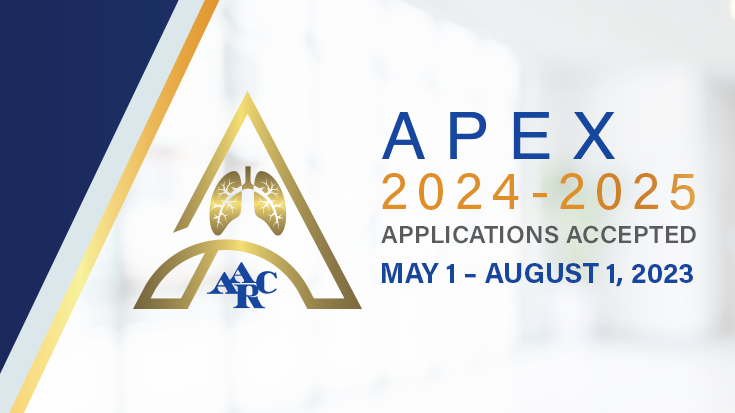
Hospitals that earn Apex recognition from the AARC are a cut above, having met 13 requirements that cover everything from advanced degrees among staff to the use of protocols in the delivery of care.
In this interview, three managers who recently received the Apex Recognition Award for their departments in the acute care hospital category — John Emberger, RRT, RRT-ACCS, FAARC, CPHQ, from ChristianaCare, Natasha Lavin, MS, RRT, RRT-NPS, CPFT, from the Children’s Hospital of Philadelphia, and Lenny Nyangwara, MSM, RRT, FAARC, from Anne Arundel Medical Center — explain why they decided to apply for the award, what they think it does for their department, and what goes into the application process.
First, tell us why your hospital decided to apply for Apex recognition from the AARC and what it has meant to your department and hospital to receive the honor.
John Emberger: This is our third time being recognized and it is a huge honor to be one of the few acute care hospitals in the country to achieve Apex, which verifies to us the excellence that our team at ChristianaCare strives for.
Natasha Lavin: We are very honored that we received this recognition for the second time. It’s a moment for us to reflect and express gratitude for our department’s dedication to our patients, families, each other, and the profession. When you lay it all out and look at it through a different lens, you really walk away with a whole new appreciation for what the expertise of the respiratory therapist can do to elevate care and the patient/family experience. The achievement gives us an opportunity to celebrate the good we do and to push it out there for the hospital and region to see.
Lenny Nyangwara: The first time our department applied for the Apex award, we learned about the award during a meeting with a director from an award-receiving department at the AARC Congress. The recognition was worth the effort and work our department was already doing. The distinction has given us beyond bragging rights, but is also an affirmation that the department’s contributions have received national recognition.
The application process requires facilities to provide documentation to meet 13 Requirements. How many people on your staff were involved in helping to collect and organize all the evidence that you were required to submit and why did you decide to get this number of people involved?
John Emberger: There were several people involved in getting all the information compiled and ready for submission. The initial time we applied was the most extensive, and since then we have maintained all the information live, as policies or people change in the department. We intentionally kept the number of people involved small so that there was consistency in gathering the needed information.
Natasha Lavin: We had six people involved in collecting, organizing, and verifying the evidence required for submission. I specifically included our education specialists because one of them develops and publishes all of our policies and procedures and the other is one of the most organized people I know. She works very closely with our new hires and is a huge help with making sure they provide us with all the information we need.
This being our second term as an Apex recipient, I tried to lean on team members who participated in the process before, as this was my first time. I would also say that the amount of people you get involved probably depends on the size of the department and how much of the information you already have easily available to you. We have over 200 respiratory therapists. That’s a lot of data to validate.
Lenny Nyangwara: The initial application required five team members to collect the necessary documentation. In subsequent applications, a team of three worked to collect required documentation. Once we streamlined the process of collecting documentation, each team member had a certain number of standards they assisted in managing continually.
Some of the requirements pertain to specific operational aspects of your department. How difficult was it to gather all this information, and what did you learn along the way about how best to go about it?
John Emberger: One of the challenges this time was how COVID impacted live meetings, PI projects, etc. Since there were fewer live meetings and more online meetings, we learned that we needed to be better with documentation of those meetings.
Natasha Lavin: The operational aspects of our department are all available through our hospital-wide policy manager. There are definitely documents that likely need to exist strictly to speak to Apex requirements. It’s a good rehearsal to ensure we are maintaining complete records on the specifics of how the department is run on a day-to-day basis.
Lenny Nyangwara: To be an Apex recognized department, the department truly operates at a higher level. Because of the higher caliber of processes, the department is involved in many process improvement projects often reported to different organizational oversight committees. It is easy to collect such operational documentations from committee minutes.
What advice do these managers have for their fellow managers considering an Apex application? We asked each of them to give us their top five tips, and here’s what they had to say —
John Emberger
- Get familiar with the standards early on!
- Verify your status on standards that you may not directly have control over. For example, do you have enough staff that have or are working towards a bachelor’s degree?
- If you don’t have a plan for PI projects, make a plan for how your department will carry out PI.
- Use this as an opportunity to be an evidence-based department that has a proactive team following therapist-based protocols.
- Consistently promote the AARC, AARC membership, and your state affiliate so that everyone in the department knows the importance of promoting the profession.
Natasha Lavin
- Make it a team effort.
- Keep the list from year to year and add/subtract as people come and go.
- Raise departmental/organizational awareness of what Apex is to gain buy in, and use this award as an opportunity to raise the level of the how your department performs, especially if you are only one or two requirements away from qualifying.
- Take comfort in the fact that the AARC Apex team is there to work with you and guide you through the process as needed.
- Start early and take it a piece at a time to avoid feeling overwhelmed in the end.
Lenny Nyangwara
- Start early to familiarize yourself with the Apex standards and start collecting easy-to-obtain requirements as part of departmental operations.
- Involve the medical director in as many of your processes as possible. The medical director’s oversight of the department is required to earn Apex recognition.
- Engrain the importance of Apex recognition in your staff.
- Department leadership should involve staff members to lessen the load of doing it all alone and also to have allies in highlighting the efforts of the department to the staff.
- It is worth it!
Learn much more about the Apex Recognition Award from the AARC here. The 2024-2025 application cycle is open now and the final deadline to submit evidence is Aug. 1, 2023.







